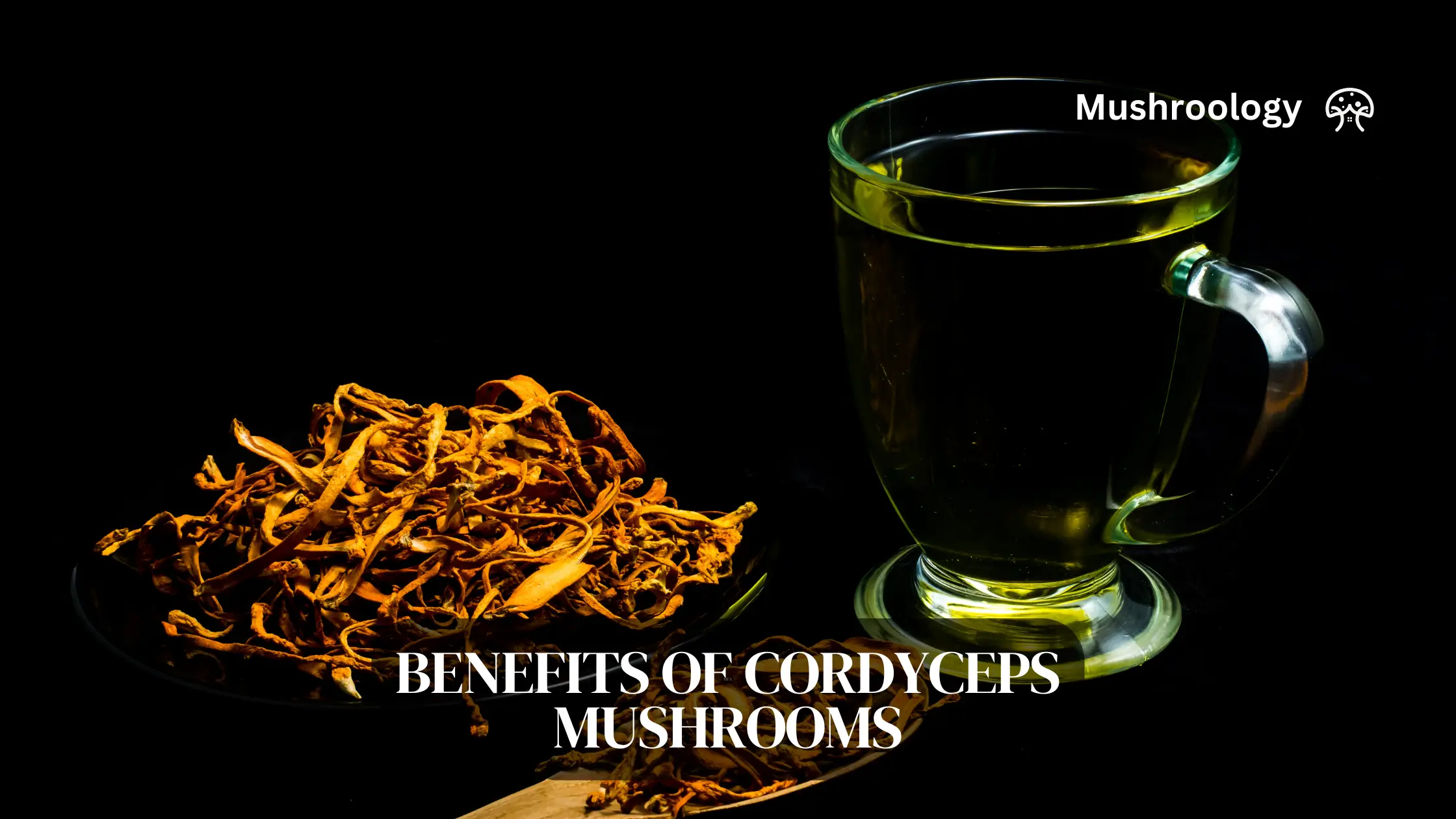Here are the key scientific findings and research related to the potential health benefits of cordyceps mushrooms:
Cordyceps benefits for athletes
Several studies suggest cordyceps can boost exercise performance and reduce fatigue:
- A 2016 study found that three weeks of cordyceps militaris supplementation significantly improved tolerance to high-intensity exercise in healthy adults.
- Cordyceps may increase VO2 max (maximum oxygen consumption) and ventilatory threshold, allowing more oxygen uptake and less fatigue during exercise.
- Cordyceps contains adenosine and cordycepin which are thought to increase ATP production, providing more energy to muscles.
- However, benefits may be greater in less-trained individuals compared to elite athletes.
Cordyceps anti-aging and antioxidant affects
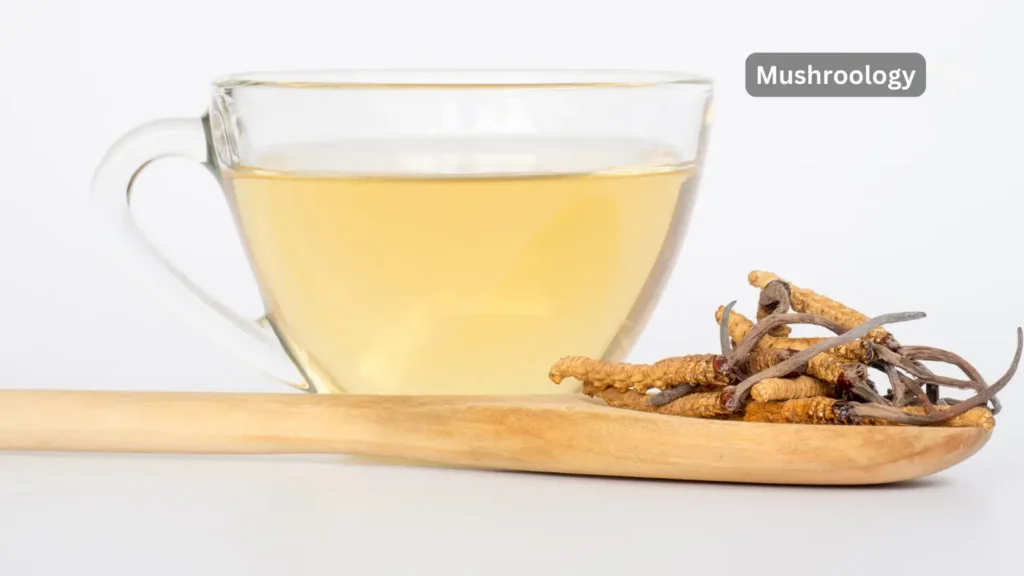
Cordyceps demonstrates anti-aging potential, likely due to its antioxidant properties:
- Studies in aged mice show cordyceps boosted antioxidant levels, and improved sexual function and memory.
- Mice given cordyceps lived longer compared to control groups in some studies.
- Research presented by Nu Skin Enterprises found cordyceps sinensis opposed age-related changes in gene expression in muscle and brain tissue of mice.
- The antioxidant effects may combat oxidative stress and damage that contributes to aging.
Cordyceps mushroom anti-inflammatory activity
The anti-inflammatory properties of cordyceps are well-documented:
- Polysaccharides and cordycepin in cordyceps suppress pro-inflammatory cytokines and enhance anti-inflammatory factors.
- Cordyceps militaris extract reduced inflammation in animal models of acute colitis and LPS-induced inflammation.
- These anti-inflammatory benefits may help treat conditions like asthma, arthritis, and Parkinson’s disease.
Cordyceps mushrooms and cardiovascular health
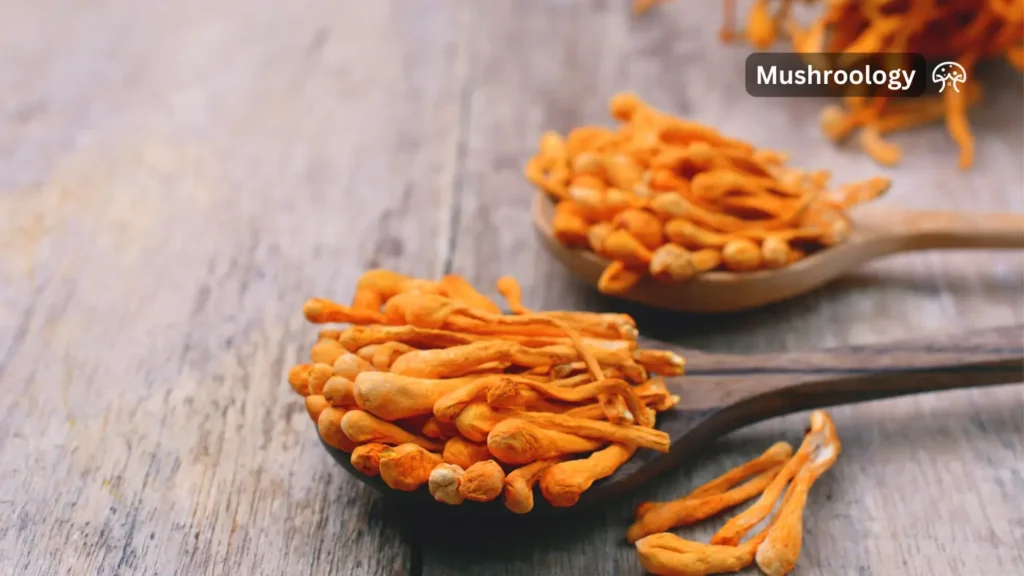
Preliminary evidence suggests cordyceps supports heart health:
- Animal studies show cordyceps lowers total cholesterol, LDL cholesterol and triglyceride levels.
- Cordyceps may help regulate arrhythmia (irregular heartbeat) based on one clinical study.
- The anti-inflammatory and antioxidant effects are also cardioprotective.
Cordyceps Mushroom for Blood Sugar Management
Cordyceps contains unique polysaccharides that may benefit blood sugar control and diabetes management:
- Animal and human studies indicate cordyceps improves insulin sensitivity and reduces blood sugar levels.
- One study in diabetic mice found cordyceps extract as effective as the drug metformin.
- More clinical trials are needed to confirm these antidiabetic effects in humans.
While many of the studies are preclinical, they provide compelling evidence for cordyceps’ potential to enhance physical performance, combat ageing, reduce inflammation, protect the heart, and manage blood sugar. More human clinical trials will help further validate these effects.
The main bioactive compounds in Cordyceps mushrooms
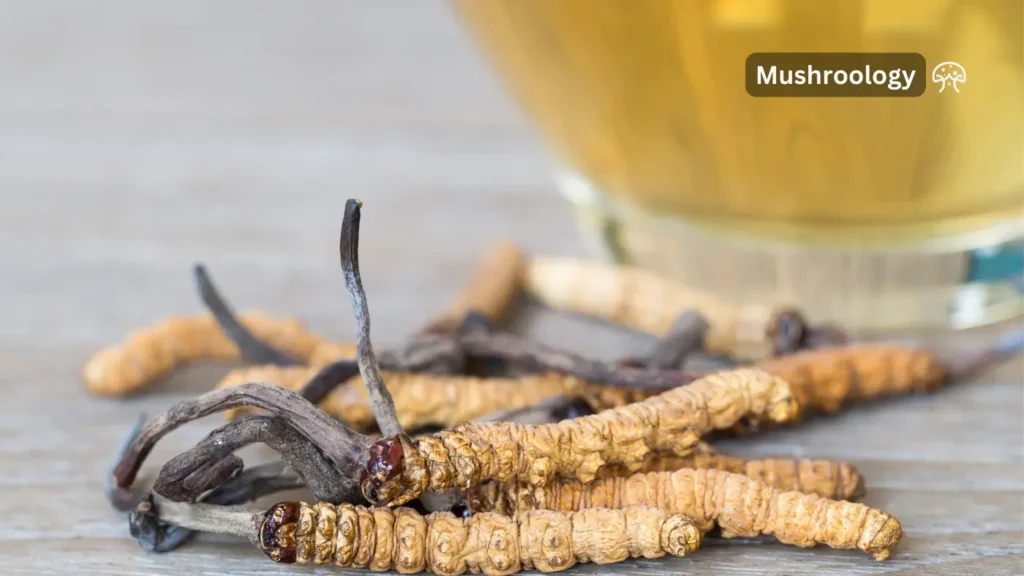
The main bioactive compounds in Cordyceps mushrooms that contribute to their various health benefits include:
1. Cordycepin (3′-deoxyadenosine) – This nucleoside analog is one of the most well-known and studied compounds in Cordyceps, especially C. militaris. It has been associated with antitumor, antioxidant, anti-inflammatory, antiviral, and ergogenic (performance-enhancing) effects.
2. Polysaccharides – Cordyceps contains unique polysaccharides that exhibit immunomodulatory, antioxidant, anti-inflammatory, antitumor, and hypoglycemic activities.
3. Ergosterol – This sterol, abundant in Cordyceps, has been linked to antitumor properties.
4. Adenosine and other nucleosides – In addition to cordycepin, Cordyceps contains adenosine and other nucleosides that may contribute to its energy-boosting and adaptogenic effects.
5. N6-(2-hydroxyethyl)-adenosine (HEA) – Another nucleoside found in Cordyceps that has received research interest for its potential biological activities.
6. Cordymin – A peptide from C. militaris with anti-inflammatory effects.
7. Amino acids and proteins – Cordyceps is a source of amino acids and bioactive proteins that may support its medicinal properties.
8. Vitamins and minerals – The presence of vitamins (E, K, B1, B2) and minerals in Cordyceps may also play a role in its health effects.
9. Other compounds – Additional constituents like cordycepic acid, γ-aminobutyric acid (GABA), and ergothioneine have been identified in Cordyceps and may have biological activities.
The medicinal properties of Cordyceps mushrooms can be attributed to a wide range of bioactive compounds, with cordycepin, polysaccharides, ergosterol, and other nucleosides being some of the most prominent and well-researched. The combination and synergy of these diverse constituents likely contribute to the multifaceted health benefits associated with Cordyceps in traditional and modern medicine.
Dosage of cordyceps supplements
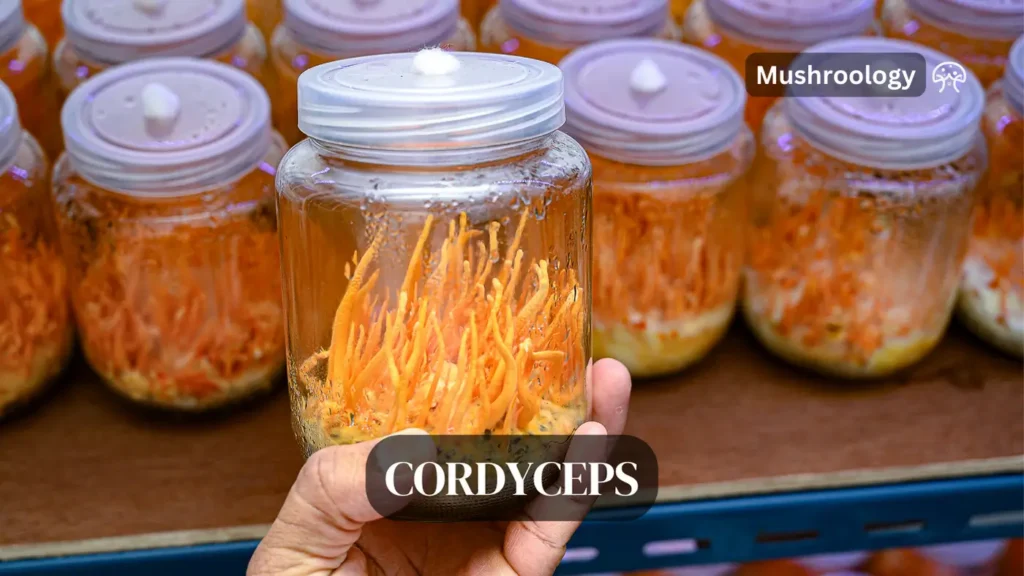
Based on the information provided in the research results, the recommended dosage of cordyceps supplements can vary depending on the specific product and the reason for use. However, there are some general guidelines:
1. Most human studies have used cordyceps dosages ranging from 1,000 to 3,000 milligrams (1-3 grams) per day.
2. For cordyceps mushroom extract supplements, a typical dose is 0.5-1 gram per day.
3. When using whole cordyceps mushroom products, a common dose is 1-3 grams daily.
4. Therapeutic doses may be higher, around 3-6 grams per day, while maintenance doses are often lower at 1-3 grams daily.
5. It’s best to start with the lowest effective dose, such as 1 gram per day, and gradually increase if needed. Follow the dosing instructions on the specific supplement you are using.
6. Consult with a healthcare provider to determine the optimal dose for your individual needs, especially if you have any underlying health conditions or are taking medications.
While dosages can vary, most people take between 1-3 grams of cordyceps supplements per day, with some taking up to 6 grams for therapeutic purposes under medical supervision. It’s important to use high-quality products and start with a low dose, increasing gradually to assess your tolerance and response.
Age restrictions for taking cordyceps supplements
There are no specific age restrictions mentioned for taking cordyceps supplements. However, there are some important considerations and precautions to keep in mind:
Children should avoid taking cordyceps supplements, as there is no evidence of their effect on children. The safety and appropriate dosage for children has not been established.
Pregnant and breastfeeding women should avoid using cordyceps to stay on the safe side, as there is not enough reliable information about the safety of taking cordyceps during pregnancy and while nursing.
Elderly individuals can take cordyceps, and some studies have even focused on the benefits in older populations. One study gave 999 mg of Cs-4 cordyceps extract per day to healthy elderly individuals aged 50-75 with positive results. However, it’s always best to consult with a healthcare provider to determine if cordyceps is appropriate for an older individual, especially if they have any underlying health conditions or are taking medications.
In general, it’s recommended that people with certain autoimmune diseases like lupus, multiple sclerosis, and rheumatoid arthritis avoid cordyceps or use it cautiously, as it may stimulate the immune system and potentially worsen symptoms. People with bleeding disorders or upcoming surgery should also be cautious.
Effects of cordyceps supplements

The time it takes to see the effects of cordyceps supplements can vary, but some key findings include:
1. One study found that healthy young adults who received 4g of Cordyceps militaris daily improved tolerance to high-intensity exercise after one week. The benefits were even greater (increased maximum oxygen consumption and ventilatory threshold) when supplementation continued for an additional two weeks.
2. Research and feedback from OM Mushrooms customers suggest that results may be seen in as little as one week of cordyceps use, with the best benefits seen with regular use of the recommended daily dose.
3. Since most of the beneficial compounds in cordyceps, including cordycepin, are water-soluble, you may notice the effects almost immediately. The water-soluble substances are absorbed within 24-48 hours, while lipid-soluble substances take 2-4 days to fully absorb.
3. In a study on the effects of cordyceps sinensis supplementation during 12 weeks of aerobic training, improvements in aerobic performance were seen at 12 weeks.
4. Another study found that a one-week supplementation period had minimal effects on physical performance, suggesting that greater benefits may require a longer supplementation period.
Some effects may be noticed as early as one week, the most significant benefits of cordyceps supplementation are typically seen with consistent use over a longer period, such as several weeks to a few months. The time to see results can also depend on the specific benefits being sought and individual factors like dosage and overall health status.
Potential risks and precautions to consider when taking cordyceps supplements
There are a few potential risks and precautions to consider when taking cordyceps supplements, especially for elderly individuals:
1. Bleeding risk: Cordyceps may act as a blood thinner and increase the risk of bleeding, especially in those with bleeding disorders or upcoming surgery. It could also enhance the effects of blood thinning medications. Elderly individuals on blood thinners should be cautious and consult their doctor before taking cordyceps
2. Hypoglycemia: Cordyceps may lower blood sugar levels. When combined with diabetes medications or insulin, it could potentially cause blood sugar to become too low (hypoglycemia). Elderly people with diabetes should be careful and monitor their blood glucose closely if taking cordyceps.
3. Interactions with immunosuppressants: Cordyceps may stimulate the immune system. This could interfere with immunosuppressive drugs taken after organ transplants to prevent rejection. Elderly transplant recipients should avoid cordyceps.
4. Gastrointestinal side effects: Some people may experience mild digestive issues like nausea, vomiting, diarrhea or dry mouth when taking cordyceps supplements. Elderly individuals may be more sensitive to these GI side effects.
5. Lack of safety data: There is limited research on the long-term safety of cordyceps use, especially in elderly populations. More studies are needed to fully understand any potential risks with chronic supplementation in older adults.
6. Quality concerns: Cordyceps supplements are not well regulated, so quality and potency can vary significantly between products. Elderly people should use caution and look for reputable brands to avoid contamination risks.
In summary, while cordyceps is generally considered safe, elderly individuals should be aware of potential risks like bleeding, hypoglycemia, drug interactions, and gastrointestinal side effects. It’s always best for older adults to consult their healthcare provider before starting any new supplements to weigh the potential benefits and risks for their individual medical situation.

